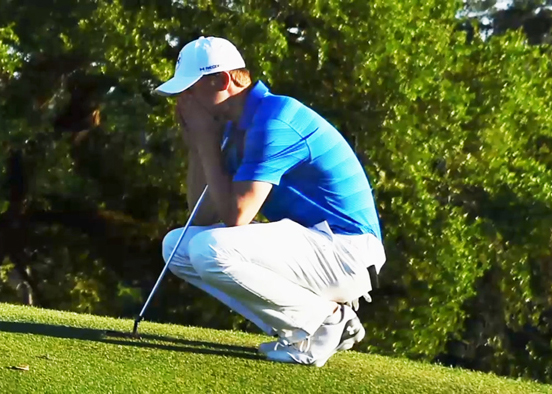
By Flint Wheeler
Well, at least he’s interesting now. Jordan Speith, a soft spoken white, tall, thin, lanky country club kid with almost zero personality was about to officially put the PGA audience to sleep until the awesome happened. A quintuple bogey (I had to look it up also) on the par 3, 12th hole woke the golf industry up. He had inched his lead to five strokes and seemed to be cruising until reality bit.
Hitting from the drop zone he did the same with his next ball. His third ball he put into the bunker. He ended up with a quadruple bogey – 4 over part for the hole. His lead was gone and his chances of winning a second consecutive Masters seemed remote.
This is something that I – along with every golfer I know – have done more than once. You are playing well enough, then in golf terms, the wheels come off and suddenly you cannot seem to make a decent shot.
The difference is that no one, other than a couple of pals, is watching. The world was watching Jordan Speith. He did recover nicely on the next hole to get a birdie. He had a chance on the next but made par, respectable but not when you need birdies to catch the new leader.
Watching Speith walk up No. 18 — a timeless stroll when you hold the lead on the final day — you could see the shadow of disappointment on his 22-year old face. Ever the good sportsman Speith removed his cap, as winners typically do to acknowledge the cheers, and made his way to the final green to putt out.
 What he did next revealed Speith as a young man wise and gutsy beyond his years. He gamely faced the media and took his medicine. The word that seemed most prevalent in the descriptions of what happened was “collapse,” not a word any golfer – or anyone — wants to have associated with their performance.
What he did next revealed Speith as a young man wise and gutsy beyond his years. He gamely faced the media and took his medicine. The word that seemed most prevalent in the descriptions of what happened was “collapse,” not a word any golfer – or anyone — wants to have associated with their performance.
Collapse did not apply to his post-game comments. “Honestly,” Speith told the media, “I think it will be tough to put it behind. I think I will, but that wasn’t a fun last couple of holes to play from the position I was in.” In Masters’ tradition, the previous year’s winner awards the green jacket to the new winner, a task that Speith had to perform. “I can’t think of anybody else who had a tougher ceremony to experience,” he said. Still Speith did not wallow; he congratulated Danny Willett, the victor, whom Speith noted, had experienced something “more important than golf,” the birth of his first child.
No one I know has ever escaped crushing disappointment in their life. These range from a bad financial decision, a failed business, or a personal loss. Most refused to be defined by disaster; each made a decision to resume their lives or sadly, let it define them. Chastened and vulnerable certainly but no less determined to continue forward.








































